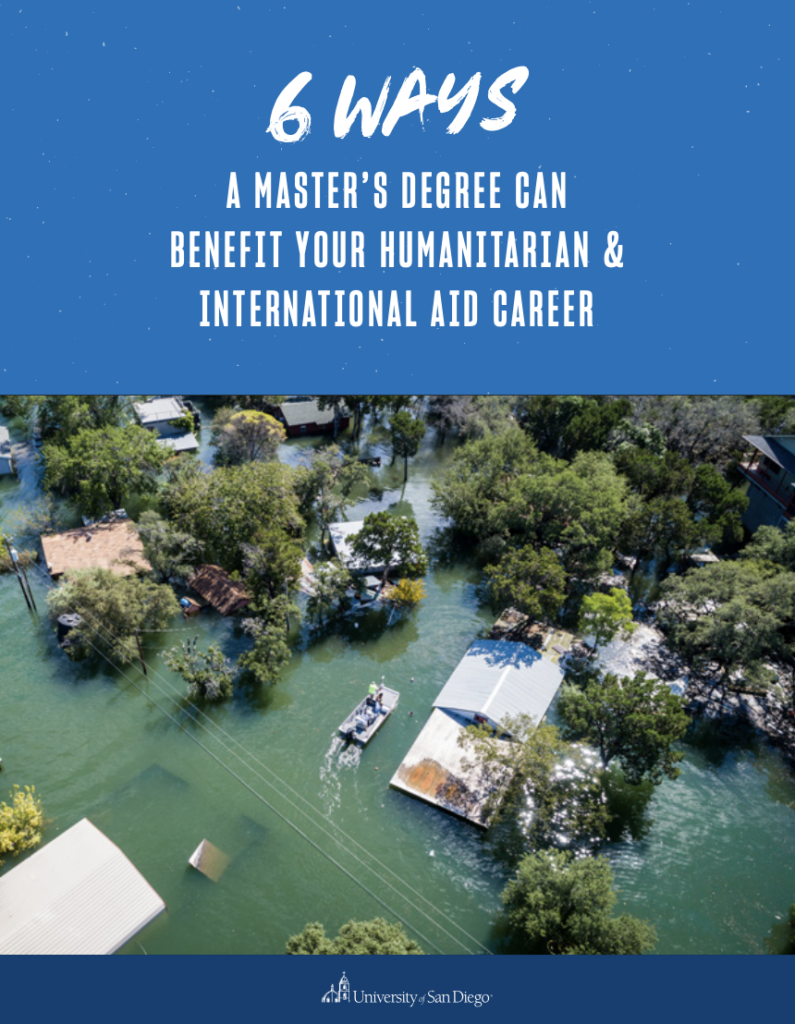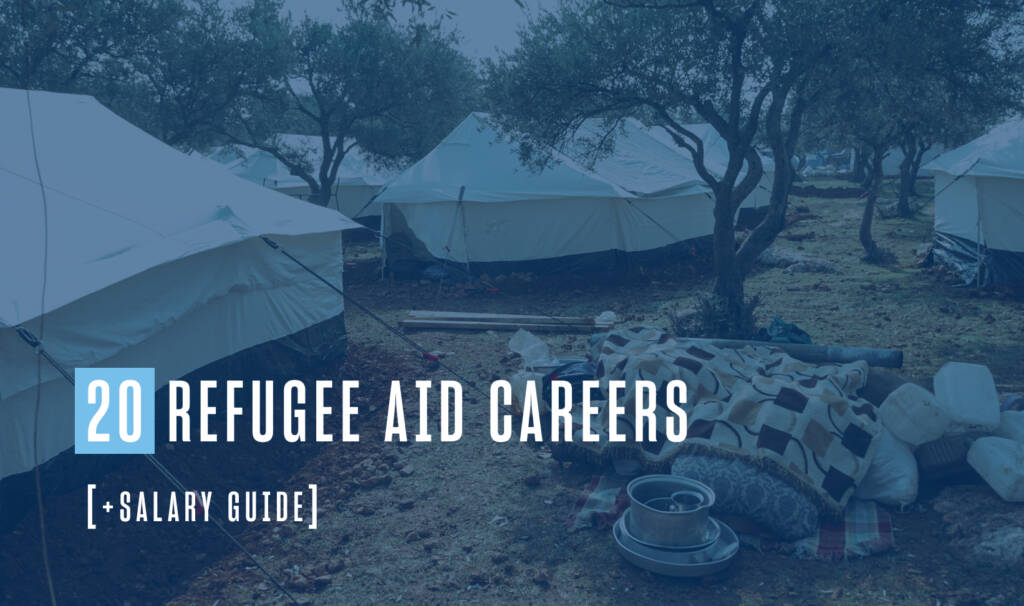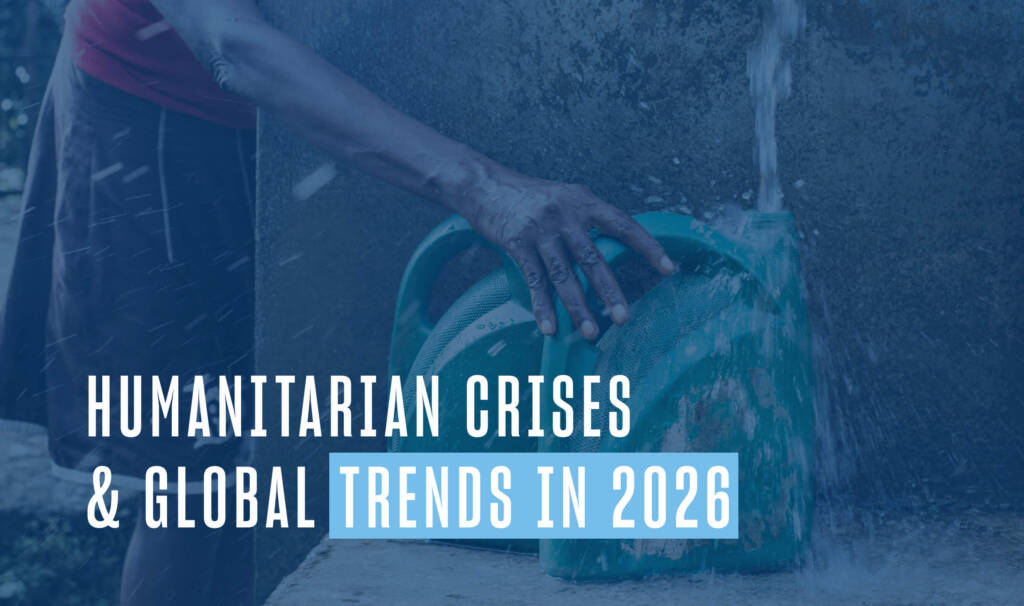Humanitarian programming, ranging from local community responses to national scale disasters, to refugee displacement, is a broad career category that offers a lot of possibilities for those interested in humanitarian work. From logistics and finance to communications and educational outreach, there is no shortage of humanitarian positions — and organizations are looking for skilled, dedicated workers to fill them.
In this comprehensive career guide, we outline common types of humanitarian careers, skills needed, organizations that are hiring — plus nine tips to help you secure the right job.
What Is a Humanitarian?
A humanitarian is defined as “a person promoting human welfare and social reform.” Humanitarian positions, whether international or domestic, fall under this umbrella.
Humanitarian programs encompass a broad category of careers that often deal with global issues that transcend borders such as chronic poverty, disease, gender equality and human rights (and many others) as opposed to a specific event that may be deemed a disaster, such as an earthquake or flood.
A professional or skilled volunteer responding to human needs related to disasters or violent conflict may be known as a development worker, humanitarian aid worker, relief worker or disaster response worker.
Types of Humanitarian Careers
Humanitarian is a large category, which means there are different types of work, depending on your interests and whether you’re located in the field or in an office. Here is a list of the most common types of career categories:
- Administrative (budgets and internal communication)
- Disaster preparation and risk management
- Fundraising
- Program research (e.g. monitoring and evaluation)
- Service provision (food or medicine distribution, etc.)
- Education and training
- Security and logistics
- Public health and medical care
[RELATED GUIDE] How to Get a Job in Disaster Relief
What Does a Humanitarian Worker Do?
An humanitarian worker is typically defined as someone who provides “support and relief to locations and individuals who have experienced natural disasters, war, or other developmental challenges.”
Here are some examples of humanitarian worker responsibilities:
- Provide a rapid assessment of a specific location/problem
- Manage budgets and allocate funds to specific departments and programs
- Research and write proposals
- Communicate with the public and external stakeholders
- Manage safety operations
- Evaluate and assess emergency situations
- Manage logistics or delivery of aid
- Train staff and volunteers
- Manage educational campaigns on specific humanitarian issues
- Provide on-the-ground support
- Organize fundraising programs and campaigns
- Liaise with foreign diplomats and politicians
Educational Requirements for Humanitarian Work
Many positions require at least a bachelor’s degree, especially those in field offices.
If you want to specialize in a particular area, consider an undergraduate degree in economics, human resources, communications, environmental studies, social work, engineering or administration.
Bachelor’s degrees in sociology, political science and international relations are also good broad-based options.
A master’s degree is often required for any type of headquarter-based or field leadership position. Advanced degrees in humanitarian action, international affairs, international development, human rights, etc. can be extremely beneficial to an humanitarian career.
[RELATED] Discover the 9 Best Degrees to Elevate Your Humanitarian Career
Beneficial Skills for Humanitarian Work
While the required education and experience will differ for each position, these skills are often needed across humanitarian careers:
- Ability to speak a second language (or multiple languages)
- Strong teamwork, communication and organizational skills
- A theoretical understanding of the context or implications of global issues
- Ability to adapt to evolving situations and cope well with high levels of stress
- Ability to multitask
- Willingness to travel and often work long hours as needed (and, in many cases, less-than-ideal conditions)
- Empathy
- Sensitivity toward other cultures
- Ability to make difficult decisions with imperfect information under time constraints
Organizations Hiring Humanitarian Workers
There is no shortage of domestic and international organizations looking to hire skilled aid workers. Here is a small sampling:
- Relief International
- International Rescue Committee
- Mercy Corps
- Save the Children
- UNHRC
- UNICEF
- Médecins Sans Frontières (Doctors Without Borders)
- CARE International
- International Rescue Committee
While you can find positions on popular employment resources such as LinkedIn and Indeed, there are job sites specifically dedicated to humanitarian-related work, such as ReliefWeb, Idealist and Devex.
Humanitarian Worker Salaries
Salary will depend on several factors, including the specific position, organization, how much experience is required and your background. Senior and top leadership-level positions will net higher salaries.
According to ZipRecruiter, the national average humanitarian aid salary is around $42,000 per year with the current range between $31,500 and $42,000.
9 Tips for Becoming an Humanitarian Worker
1. Gain Volunteer Experience
There are many reasons why volunteering is beneficial: you can overcome a personal challenge, discover a new career path, meet like-minded individuals and build your interpersonal skills. At the heart of volunteering, however, is the passion and pursuit of helping those in need, which aligns with a career in humanitarianism.
Find a type of volunteer work that piques your interest. Are you intrigued by health education? Contact your local hospital to see how you can help. Do you have a passion for connecting women and children to critical services? Seek out shelters or community programs that could use your skills and services.
Resources like VolunteerMatch, Red Cross, United Way, Volunteer.gov and Catholic Charities are a good starting point. You can also find volunteer opportunities through your local library or city/town government.
2. Consider an Internship
It’s no secret that an internship is often an important career stepping stone. Benefits include connecting with skilled professionals in your desired industry and gaining hands-on knowledge and experience. Plus, many internships are paid and/or provide college credit. Here are some to consider:
- UNICEF Internship Programme
- American Red Cross Internship Opportunities
- Médecins Sans Frontières (Doctors Without Borders) Paid Internship Program
- The Leadership Conference on Civil and Human Rights
- World Food Programme Internships
- CARE USA Internships & Fellowships
You can also find opportunities on popular career resource sites such as Idealist and ReliefWeb.
3. Invest in a Relevant Master’s Degree Program
Many field and headquarters-based positions require a master’s degree, which means that investing in your education will allow you to pursue more humanitarian opportunities. Plus, a master’s degree will connect you with other humanitarians in the industry and offer valuable hands-on training and experience.
Look for a program that uses a multidisciplinary approach to teach the following topics:
- Assessing humanitarian needs
- Managing complex global emergencies
- Aid delivery, management and logistics
- Emergency preparedness
- Humanitarian leadership
- Effective communication
[PDF DOWNLOAD] Discover the 6 Ways a Master’s Degree Can Benefit Your Humanitarian Career
4. Hone Your Skills and Expertise
Are you good with numbers and budgets? Do you enjoy public speaking? Interested in data analysis or program evaluation? Think about your skills and interests and how they may align with certain positions. Since there are many types of humanitarian careers, professionals with different strengths and expertise are needed.
5. Conduct Informational Interviews
This is an informal conversation with a person who works in an area you’re interested in. It’s also a helpful way to learn more about a particular position or organization without the pressure of a formal job interview.
If you have a connection at a humanitarian organization, that’s a good place to start. If you don’t — no worries! Here are some tips for nailing an informational interview:
- Be confident. It may seem daunting to reach out and ask for an interview, but many people are willing to help if asked. Connect with potential interviewees on LinkedIn and include a note in your connection request that explains how you’d like to chat about their position. (Many people enjoy talking about themselves and will be flattered.)
- Come prepared and ask questions. Spend time learning about the interviewee’s organization and write down some questions ahead of time.
6. Consider Learning a Foreign Language
Mastering another language may increase your chances of working in humanitarian work. While it may seem intimidating to embark on this kind of learning experience, consider starting small. Learn common words and phrases that could potentially help you in a humanitarian career.
The good news is that there are plenty of at-home programs, tools and apps that allow you to learn at your own pace.
7. Stay Up To Date on Global Issues and Events
It’s important to know what’s going on in the world — especially if you’re considering a career in humanitarianism. Watch the news, seek out helpful books and websites and keep your finger on the pulse of the humanitarian community. Here are some helpful resources to bookmark:
- UN News
- The New Humanitarian
- ReliefWeb
- United Nations Office for the Coordination of Humanitarian Affairs
- Mercy Corps
[RELATED] Stay Informed: Here Are 15 Important Humanitarian Crises and Trends to Follow
8. Be Willing to Travel
The nature of humanitarian work is often transient, which means you must be willing to spend time away from home. The frequency and duration, however, will depend on the position.
For example, certain humanitarian workers, country directors and operations specialists will often spend 1-2 years in one location (or the entire lifecycle of a project or disaster response). Doctors and epidemiologists typically have a more limited deployment — perhaps just a few weeks. Many headquarters-based positions (such as grant writers and program directors) work out of one location but may travel as needed.
No matter what type of humanitarian position you’re interested in, it’s important to understand that some type of travel will likely be required.
9. Nurture a Commitment to the Importance of Humanitarian Work
Humanitarian work is not easy. It can be difficult and emotional — and even dangerous, at times. But it is important and meaningful. Humanitarian work serves a purpose, and the world constantly needs action-minded leaders and compassionate, experienced professionals who are dedicated to helping those in need.
Being a dedicated humanitarian will look different for each person. Some may pursue additional training and education; others may look for volunteer opportunities beyond their regular job. No matter how you choose to nurture this commitment, know that a dedication to humanitarianism will help you succeed in any type of humanitarian role.
Elevate Your International Aid Career With a Master’s Degree from USD
The 100% online University of San Diego Master of Science in Humanitarian Action provides an innovative, multidisciplinary curriculum taught by experienced, knowledgeable faculty. Position yourself for leadership and success in the humanitarian field with a master’s degree you can earn in just 20 months.
Connect with a USD enrollment advisor today for more information.





